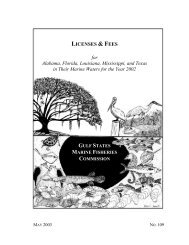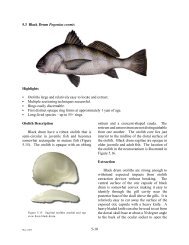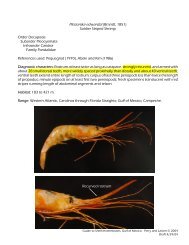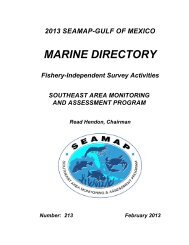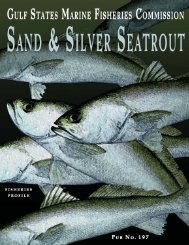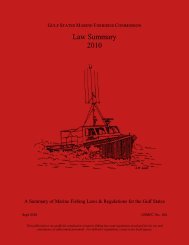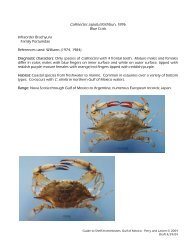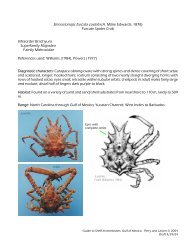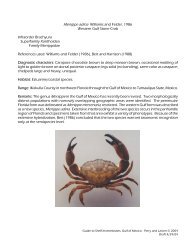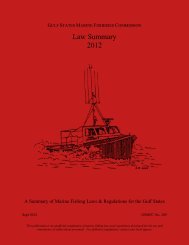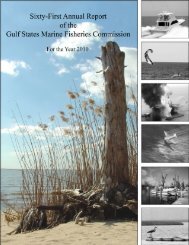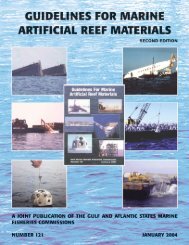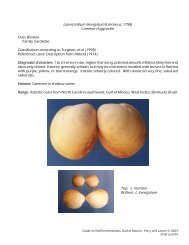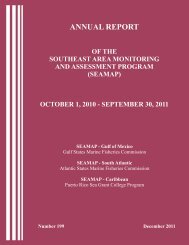Basic Commercial Fishing Regulations - Gulf States Marine ...
Basic Commercial Fishing Regulations - Gulf States Marine ...
Basic Commercial Fishing Regulations - Gulf States Marine ...
You also want an ePaper? Increase the reach of your titles
YUMPU automatically turns print PDFs into web optimized ePapers that Google loves.
Snook gets extra<br />
protection<br />
Record-breaking cold temperatures in the winter of 2010 impacted many<br />
of Florida’s species, including fish. Certain species of fish in Florida cannot<br />
tolerate prolonged periods of cold weather; snook is one of these species. The<br />
FWC issued Executive Order 10-03 for snook, bonefish and tarpon to protect<br />
these important Florida gamefish species from further harm. The FWC took<br />
these actions to provide protection for these species and to give research<br />
scientists time to evaluate any potential damage that may have occurred to<br />
the stocks of these species during the unusual cold-weather period.<br />
Since the cold weather incident, researchers with the FWC’s Fish and Wildlife<br />
Research Institute (FWRI) continued their long-term monitoring programs<br />
of a variety of species. The researchers used this information, along<br />
with other data to assess the impact of the 2010 cold kill event on Florida’s<br />
common snook populations as this species appeared to have been drastically<br />
affected by this cold weather event. Their findings were summarized in the<br />
Snook Cold Kill Report. These initial findings suggest there was a greater<br />
vulnerability to low water temperatures by smaller-sized common snook<br />
and indicate that adult snook in different parts of Florida were impacted<br />
differently by the cold kill. In addition, data suggests that there was likely<br />
a smaller impact from the cold kill on adult snook on the Atlantic Coast<br />
than on the <strong>Gulf</strong> Coast. Although Atlantic Coast snook suffered some level<br />
of mortality from the cold kill, a significant proportion of reproductive-sized<br />
fish survived to spawn.<br />
The FWC Commissioners decided to take additional action to protect Florida’s<br />
snook population after reviewing the latest available information on<br />
the status of the snook population and considering public input. The Commission<br />
ruled to reopen the recreational harvest season of snook on September<br />
17, 2010 in Atlantic waters and maintain a closed season for snook<br />
in <strong>Gulf</strong> waters.<br />
In Atlantic state waters, the snook fishery closed as normally scheduled on<br />
December 15, 2010, and remains closed until September 1, 2011. In <strong>Gulf</strong><br />
state waters, Everglades National Park and Monroe County state and federal<br />
waters the snook fishery will remain<br />
closed until September 1, 2011. Anglers<br />
may still catch and release snook during<br />
snook harvest closures.<br />
To learn more about snook research<br />
or to read the Snook Cold Kill Report,<br />
please visit research.MyFWC.com.<br />
YOU support Florida’s Snook<br />
Fishery!<br />
Revenue generated through the<br />
purchase of the Snook permit is used<br />
exclusively for programs benefitting<br />
Florida’s snook population. Major<br />
programs that are funded by the snook<br />
permit fee include stock enhancements,<br />
snook tagging programs, fisheryindependent<br />
sampling and fisherydependent<br />
sampling. fee include stock<br />
enhancements, snook tagging programs,<br />
fishery-independent sampling<br />
and fishery-dependent sampling.<br />
Wildlife Alert Reward<br />
Program<br />
Report fish and wildlife law violations<br />
by calling toll-free 1-888-404-FWCC<br />
(3922); on cell phones, dial *FWC or<br />
#FWC depending on service carrier;<br />
or click MyFWC.com/Contact. For<br />
more information, see page 9.<br />
Make sure there are<br />
fish for tomorrow<br />
Only half of Florida’s anglers buy a<br />
license, but their license fees are<br />
a vital source of funding for fish<br />
and wildlife conservation. Seniors,<br />
youths and others that are exempt<br />
can contribute to fish and wildlife<br />
conservation simply by voluntarily<br />
buying a fishing license.<br />
Each license you buy captures more<br />
Federal Aid in Sport Fish Restoration<br />
money and brings tackle and motor<br />
boat fuel taxes home to Florida.<br />
Visit: MyFWC.com<br />
Call: 888-FISH-FLORIDA<br />
Buy your license online!<br />
When you buy your license online,<br />
it’s fast, convenient and saves time<br />
and travel.<br />
You can obtain a license 24 hours<br />
a day at MyFWC.com/LICENSE and<br />
begin fishing immediately!<br />
Licenses are also available<br />
toll-free at 1-888-FISHFLORIDA<br />
(1-888-347-4356). Processing<br />
fees apply to telephone and<br />
Internet sales.<br />
3 January 1, 2011 – June 30, 2011 Florida Fish and Wildlife Conservation Commission<br />
16



